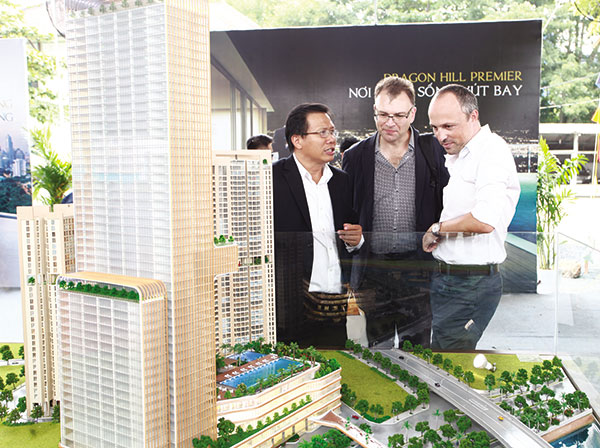Foreign property lags
 |
According to the latest figures from the Ministry of Construction (MoC), as of July 2017, there were less than 800 cases reported of foreigners being granted housing ownership in Vietnam. This figure is quite low compared to the total number of foreigners living and working in the country – about 82,000.
According to Savills Vietnam, the main barriers discouraging foreigners from pursuing real estate ownership are uncertainties in local laws and legal procedures, as well as unfamiliar administrations.
Many foreigners have expressed interest in Ho Chi Minh City, Hanoi, and Danang real estate. The number of red books (ownership certificates) issued to foreign organisations and individuals buying houses has been relatively low considering the high levels of interest and demand.
However, Sergey Nam, deputy CEO of Kusto Home, the developer of Ho Chi Minh City District 2 development Diamond Island, said that the number of foreigners buying units in Diamond Island has been increasing, and the set targets have almost been hit. “Actually, we have to admit that the revised Law on Housing in Vietnam, which took effect on July 1, 2015, has affected the foreign buyers. It’s easier for foreigners to buy residential properties in Vietnam, as long as they can enter the country legally. There is no need for a residence visa, unlike in previous periods. The two-fold rise in foreign buyers in our Diamond Island project in District 2 has shown their interest in Vietnam’s property,” Nam told VIR.
He further added that the big challenge now is clearing up how foreigners apply for and receive ownership certificates for 50 years, and to figure out what the terms and conditions to extend leaseholds are.
“If it was clear by now, I am sure the number of foreign buyers would be much bigger,” he added.
According to Circular No.19/2017/TT-BXD and Decree No.99/2015/ND-CP issued by MoC, regulating the number of houses and apartments owned by foreigners was meant to tighten resale procedures and increase transparency in legal and administrative processes.
However, adjusting limits to make them more suitable for areas with special demands, such as condominiums or Grade A apartments, is another direction that needs consideration.
The flexibility of limited-area coverage over fixed limits would support the market, especially with more than 82,000 foreigners living and working in Vietnam.
Residential Sales director of Savills Ho Chi Minh City Nguyen Khanh Duy said that the law allowing foreigners to buy real estate in Vietnam has received positive feedback from sellers and buyers alike.
“The Ho Chi Minh City real estate market has seen thousands of successful transactions with foreign clients over the last two years,” Duy said.
Generally, requirements have become clearly defined and the evolution of the local real estate market has created a new source of demand.
Nam from Kusto Home said that Vietnam is seen as a new destination for both living and investing, based on the positive economic signals and newly-updated land-related laws. The number of foreign buyers aiming to own property in Vietnam is increasing every year.
“I believe the government is on the right track and a lot has been done so far. We are looking forward to additional instructions to be issued very soon,” he said.
In 2017, many projects quickly reached the 30 per cent foreign ownership limit (in terms of units) in a very short time. The 30 per cent quota on many developments was reached almost immediately, forcing developers to turn away many interested foreigners looking to buy.
According to property consultants, clients were mainly Asian, from places such as Korea, China, Taiwan, Hong Kong, and Singapore.
Projects and products attracting overseas buyers are mainly in the high-end segment. A great deal of buyer appeal is in buy-to-let properties – as potential lease income is an attractive investment.
What the stars mean:
★ Poor ★ ★ Promising ★★★ Good ★★★★ Very good ★★★★★ Exceptional
Latest News
More News
- Dong Nai experiences shifting expectations and new industrial cycle (January 28, 2026 | 09:00)
- An Phat 5 Industrial Park targets ESG-driven investors in Hai Phong (January 26, 2026 | 08:30)
- Decree opens incentives for green urban development (January 24, 2026 | 11:18)
- Public investment is reshaping real estate’s role in Vietnam (January 21, 2026 | 10:04)
- Ho Chi Minh City seeks investor to revive Binh Quoi–Thanh Da project (January 19, 2026 | 11:58)
- Sun Group launches construction of Rach Chiec sports complex (January 16, 2026 | 16:17)
- CEO Group breaks ground on first industrial park in Haiphong Free Trade Zone (January 15, 2026 | 15:47)
- BRIGHTPARK Entertainment Complex opens in Ninh Binh (January 12, 2026 | 14:27)
- Ho Chi Minh City's industrial parks top $5.3 billion investment in 2025 (January 06, 2026 | 08:38)
- Why Vietnam must build a global strategy for its construction industry (December 31, 2025 | 18:57)

















 Mobile Version
Mobile Version